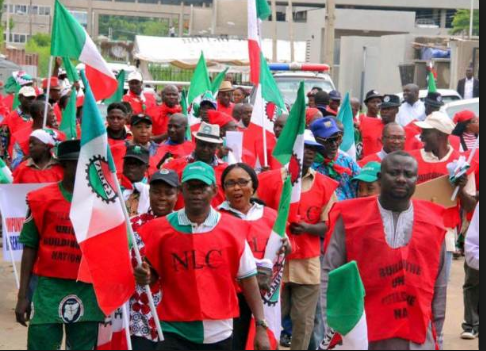The Nigeria Labour Congress (NLC) and Trade Union Congress (TUC) abandoned the minimum wage negotiation following the Federal Government’s offer of N48,000, a figure far below their demand of N615,000 as the new national minimum wage.
Expressing their discontent with the offer, which they described as “an insult to the sensibilities of Nigerian workers,” labour leaders convened an emergency press conference after exiting the negotiation session.
This marked the second consecutive deadlock in negotiations, with the previous session on April 29 failing to reach an agreement due to labour’s insistence on N615,000 as the minimum wage.
While the Federal Government deemed labour’s demand unreasonable, NLC President Joe Ajaero defended the proposed amount, stating that it was arrived at after analyzing the current economic situation and the needs of an average Nigerian family.
Breaking down the N615,000 demand, Ajaero highlighted various expenses such as housing, electricity, food, healthcare, education, transportation, and sanitation, stressing the importance of a wage that sustains workers’ livelihoods.
Despite the government’s offer of N48,000 and the organised private sector’s initial proposal of N54,000, Ajaero criticized both parties for their unwillingness to negotiate fairly, emphasizing the disparity between the proposed minimum wage and prevailing standards.
He accused the government of lacking transparency and good faith in the negotiation process, urging them to provide substantiated data to support their offer.
In response to the breakdown in negotiations, Ajaero announced labour’s decision to walk out of the negotiation, emphasizing their commitment to advocating for the rights and interests of Nigerian workers.
While urging the government to reconsider its position and engage in reasonable dialogue, Ajaero called for a national minimum wage of N615,000, aligning with President Bola Tinubu’s pledge to ensure a living wage for Nigerian workers.
The Presidency and relevant government officials were unavailable for comment at the time of filing this report.
President Tinubu inaugurated the 37-member Tripartite Committee on Minimum Wage on January 30, 2024, to develop a new minimum wage ahead of the expiration of the current N30,000 wage on April 18.
The committee, chaired by former Head of the Civil Service of the Federation, Goni Aji, includes representatives from federal and state governments, the private sector, and Organised Labour, tasked with recommending a new national minimum wage for the country.
Despite the walkout by Organised Labour, the Nigeria Employers’ Consultative Association has urged labour leaders to return to the negotiating table.













